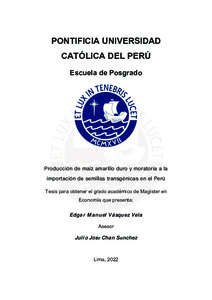| dc.contributor.advisor | Chan Sanchez, Julio Jose | |
| dc.contributor.author | Vásquez Vela, Edgar Manuel | |
| dc.date.accessioned | 2022-08-23T15:44:27Z | |
| dc.date.available | 2022-08-23T15:44:27Z | |
| dc.date.created | 2022 | |
| dc.date.issued | 2022-08-23 | |
| dc.identifier.uri | http://hdl.handle.net/20.500.12404/23169 | |
| dc.description.abstract | En diciembre del 2011 se promulgó la Ley de moratoria al ingreso y producción de
organismos vivos modificados (OVM), la cual prohíbe su uso con fines de cultivo en el
Perú. En marzo de 2015, como parte de la implementación de dicha ley, se publicó a
consulta el listado de mercancías restringidas, en el cual se incorporó al maíz amarillo
duro (MAD) para siembra, fecha a partir de la cual los productores e importadores
tuvieron certeza de su incorporación en la moratoria. En términos económicos, esta
medida representa una protección comercial en el mercado de semillas y una restricción
tecnológica para la producción nacional de MAD, la cual compite con MAD importado
que no enfrenta la misma restricción en sus países de origen. Por su parte, en abril de
2015 se modificó la metodología de cálculo del derecho adicional resultante del sistema
de franja de precios (SFP) aplicable a las importaciones de MAD. La presente
investigación estudia el comportamiento de la producción de MAD en el Perú ante la
imposición de la moratoria de OVM, mediante el análisis de la interacción de la
producción de MAD con las principales variables relacionadas, como importación de
MAD, producción de carne de aves, precios de importación de semillas de MAD, la
imposición de la moratoria a OVM y la aplicación del SFP; para lo cual se aplica un
modelo de Vector Auto Regresivo (VAR). Se encuentra un quiebre estructural en la
producción de MAD a partir del cuarto trimestre de 2015, el cual tiene un efecto negativo
en su comportamiento posterior y el cual se asocia a la moratoria a OVM. Asimismo,
existe una repuesta positiva y significativa de la producción de MAD respecto de rezagos
de sí misma, y una respuesta negativa y significativa a cambios en el precio de
importación de semillas de MAD. Finalmente, no se encuentra relación significativa de
la producción de MAD con la aplicación del derecho adicional del SFP. | es_ES |
| dc.description.abstract | In December 2011, the Law on the moratorium on the entry and production of genetically
modified organisms (GMO) was enacted, which prohibits their use for crops in Peru. In
March 2015, as part of the implementation of the law, the list of restricted goods was
published for consultation, in which the seeds of hard yellow corn (MAD) were
incorporated, the date from which producers and importers had certainty of their inclusion
in the moratorium. In economic terms, this measure represents a trade protection in the
seed market and a technological restriction for the national production of MAD, which
competes with imported MAD that does not face the same restriction in their countries of
origin. For its part, in April 2015, the methodology for calculating the additional duty
resulting from the price band system (SFP) applicable to MAD imports was modified.
This research studies the behavior of MAD production in Peru with respect to the
imposition of the GMO moratorium, by analyzing the interaction of MAD production with
the main related variables, such as MAD imports, poultry meat production, MAD seeds
import prices, the imposition of the moratorium on GMO, and the application of the SFP;
for which a Vector Auto Regressive (VAR) model is applied. A structural break was found
in the production of MAD from the fourth quarter of 2015, which has a negative effect on
its subsequent behavior, and which is associated with the moratorium on GMOs.
Likewise, there is a positive and significant response of MAD production with respect to
lags of itself, and a negative and significant response to changes in the import price of
MAD seeds. Finally, no meaningful relationship was found between the production of
MAD and the application of the additional duty of the SFP. | es_ES |
| dc.language.iso | spa | es_ES |
| dc.publisher | Pontificia Universidad Católica del Perú | es_ES |
| dc.rights | info:eu-repo/semantics/openAccess | es_ES |
| dc.rights | Atribución 2.5 Perú | * |
| dc.rights.uri | http://creativecommons.org/licenses/by/2.5/pe/ | * |
| dc.subject | Maíz--Perú | es_ES |
| dc.subject | Derecho agrario--Perú | es_ES |
| dc.subject | Plantas transgénicas | es_ES |
| dc.subject | Agricultura biológica--Derecho y legislación--Perú | es_ES |
| dc.subject | Alimentos transgénicos--Perú | es_ES |
| dc.title | Producción de maíz amarillo duro y moratoria a la importación de semillas transgénicas en el Perú | es_ES |
| dc.type | info:eu-repo/semantics/masterThesis | es_ES |
| thesis.degree.name | Maestro en Economía | es_ES |
| thesis.degree.level | Maestría | es_ES |
| thesis.degree.grantor | Pontificia Universidad Católica del Perú. Escuela de Posgrado. | es_ES |
| thesis.degree.discipline | Economía | es_ES |
| renati.advisor.dni | 06391755 | |
| renati.advisor.orcid | https://orcid.org/0000-0002-5750-9794 | es_ES |
| renati.author.dni | 10720558 | |
| renati.discipline | 311317 | es_ES |
| renati.juror | Zegarra Mendez, Eduardo Ariel | es_ES |
| renati.juror | Chan Sanchez, Julio Jose | es_ES |
| renati.juror | Cuadra Carrasco, Gabriela Del Pilar | es_ES |
| renati.level | https://purl.org/pe-repo/renati/level#maestro | es_ES |
| renati.type | https://purl.org/pe-repo/renati/type#tesis | es_ES |
| dc.publisher.country | PE | es_ES |
| dc.subject.ocde | https://purl.org/pe-repo/ocde/ford#5.02.01 | es_ES |






